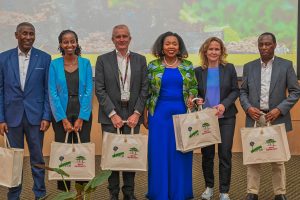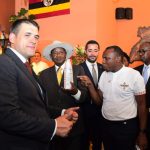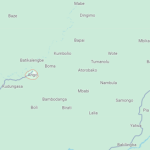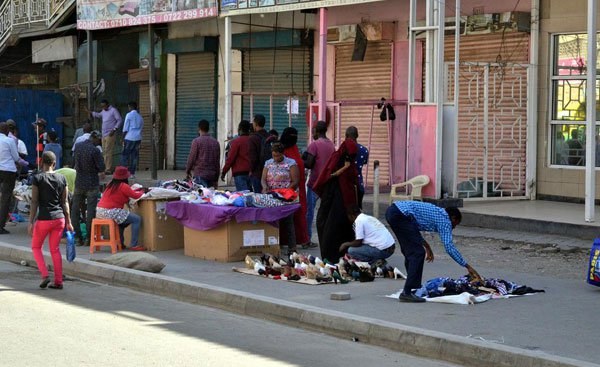
Nairobi, Kenya
Trees and forests play a crucial role in achieving several Sustainable Development Goals, including SDG 13 Climate Action (carbon storage and sequestration) , SDG 15 Life on Land (harboring biodiversity), SDG 2 Zero Hunger and SDG 12 Responsible Production and Consumption( provision of food, fodder, fuel wood and more) , SDG 6 Clean Water and Sanitation ( Watershed protection), and SDG 1 No Poverty ( supporting rural livelihood with forest products) which contribute to biodiversity, food, fodder, fuel wood, watershed protection, and support rural livelihoods with forest products.
Éliane Ubalijoro, CEO of the Center for International Forestry Research and World Agro-forestry (CIFOR-ICRAF), says the importance of high-quality seeds for the right species, fostering resilient ecosystems for food security, biodiversity, livelihoods, and climate stabilization.
“Seeds are a prerequisite for successful restoration activities, whether it’s in forests or agro-forestry systems. This project will contribute to Africa’s commitment towards the Bonn Challenge and AFR100 to bring back 100 million hectares of lost forests and degraded farmlands”, she said.
She believes investing in seed systems preserves heritage, protects biodiversity, and builds a global commons for high-quality tree seed systems, including the private sector, ensuring a sustainable future for generations to come.
“Exotic species create ecological deserts that not only fail to contribute to the thriving of local biodiversity but are also a void in terms of biocultural preservation. The critical importance of this project is beyond nature-based solutions; it is also about preserving heritage”, Ubalijoro said.
The €20 million landscape restoration project aims to improve native tree seed production and supply-demand dynamics through knowledge sharing, seed mobilization, and capacity development. It addresses local and global challenges through tree planting for current and predicted climates, leveraging local knowledge, science, and cooperation between communities, public and private sectors for scalable and sustainable restoration.
African governments are partnering with leading organizations to improve their operations and enhance their overall efficiency.
Gitonga Mugambi, Principal Secretary of the State Department of Forestry, Kenya, said Kenya is launching a project to restore 5.1 million hectares of native forest by 2030 under the Bonn Challenge and AFR100 initiatives.
“We will make this project a success in Kenya. There might be challenges along the way, but we will go for partnerships, consultations and open discussions so everything goes right.” Mugambi said.
The project aims to address seeds and seedlings policy and systems, creating jobs and value chains from seed to tree, contributing to the environment through carbon sequestration, and providing materials for various activities that will improve biodiversity and restore landscapes to their original state.
“By greening Kenya, we address one of the major priorities of this country and even globally because when we restore our ecosystems, we also create livelihoods for our people.” He said.
Mugambi revealed they are undertaking forestry legal reforms, trying to bring in the private sector and strengthening the value chain to grow trees sustainably and improve our economy.
“We are improving our agro-forestry, and biodiversity is a niche we want to address.” said Mugambi.
Deputy Director General Motuma Tolera revealed that Ethiopia is aiming to build a Climate Resilient Green Economy by 2030 and restore 15 million hectares of native forest under the Bonn Challenge and AFR100 initiatives. The project focuses on sustainable agriculture, climate change adaptation, sustainable energy, tourism, and water.
“Because of its wide altitudinal variation, Ethiopia has diverse forest ecosystems which are very important in linking upper and downstream communities and sustaining livelihood. At the same time, most of our rivers emanating from these forest ecosystems cross boundaries, reaching neighboring countries. So, investing in forests is about sustainable water reaching beyond Ethiopia.” He says.
Tolera explains that investing in forestry goes beyond the forest sector to sustainable economic growth. The initiative aims to fill the gap in the quality of planting materials by planting the right tree, in the right place, for the right purpose.
Beatrice Cyiza, Director General of Rwanda’s Environment and Climate Change Department, believes this project is timely and will help change the course of Rwanda’s greening efforts.
“Availability and accessibility of seeds and planting materials for the native tree species has been a major challenge to embark on the efforts of restoring our landscape in the right way. We hope this project will help change the course and help restore most native species.” Cyiza explained.
She said Rwanda is implementing a project to restore 2 million hectares of land and transition to a green economy by 2050. The project aims to focus on the benefits of communities and ecosystems, restoring forests with native species and restoring their ecological, cultural, and economic benefits.
“Restoring with native tree species contributes to overcoming malnutrition and gender problems, alleviating poverty, developing value chain and promoting community and gender equality-based enterprises. Native tree species play a critical role in restoring ecosystem functionality and conserving threatened plant species in danger.” Cyiza narrated.
Further the project will also aid Burkina Faso’s participation in the African Union Great Green Wall initiative and its commitment to restore 5 million hectares of land under AFR100 and the Bonn Challenge, while also working closely with Uganda to restore 12% of its total land area of 2.5 million hectares.
The Right Tree, Right Place: Seed Project addresses the issue of over-reliance on exotic trees for reforestation, focusing on planting biodiverse native species for local ecological conditions, ensuring long-term sustainability.
Ramni Jamnadass, Senior Advisor of Biodiversity and Trees Genetic Resources at CIFOR-ICRAF and Principal Scientist emphasized the importance of enabling policies and institutions for the native tree seed supply sector, developing technical capacity, linking nurseries, and sharing knowledge to inspire Pan-African-scale initiatives.
“Africa faces alarming degradation of its landscapes. Over 50% of the continent’s land area is classified as degraded, costing billions in lost productivity annually and threatening livelihoods. Compounding this crisis is the rapid loss of biodiversity, including gene pools of African forests. As the State of the World’s Trees 2022 report published by Botanic Gardens Conservation International (BGCI), with extinction due to deforestation and climate change. Africa is especially vulnerable from this loss of nature’s resilience.” Jamnadass explained.
The project will be implemented over a six year period from 2024-2029, targeting various groups including farmers, seed suppliers, nursery operators, and government agencies and it aims to cover 20 million hectares of land by 2045, conserve 4 million tonnes of soil per year, achieve 19 million tonnes of sequestered CO2 and increase employment of over 80,000 jobs in tree harvesting amid key barriers addressed included limited access to quality tree planting materials and knowledge on multiplication and delivery channels for native tree species.
“This ambitious six-year initiative aims to enhance landscape restoration across sub-Saharan Africa by ensuring a sustainable supply of high-quality seeds and seedlings of diverse native tree species.” Jamnadass revealed.
“By following our mantra ‘the right tree for the right place’, I am supremely confident this project will accelerate progress toward Bonn Challenge and AFR100 goals to bring back millions of hectares of lost forests and farmlands. The result will be more climate-resilient, biodiverse landscapes that enhance food and water security, create green jobs, sequester carbon and bolster national development.” Said Jamnadass.
The “Right Tree, Right Place: Seed Project” in Nairobi, Kenya, is a climate initiative utilizing native tree seeds to boost African land restoration efforts in Kenya, Uganda, Ethiopia, Rwanda, and Burkina Faso.
The initiative aims to improve seed accessibility, coordination between public and private sectors, and establish viable business models to promote the adoption of native tree seeds, bridging the gap between planting policy and execution.
The Right Tree, Right Place: Seed Project, funded by the German Federal Ministry for the Environment, Nature Conservation and Nuclear Safety, is implemented by CIFOR-ICRAF, Unique Land Use GmbH, Botanic Gardens Conservation International, the Global Landscapes Forum, and the University of Copenhagen.



















